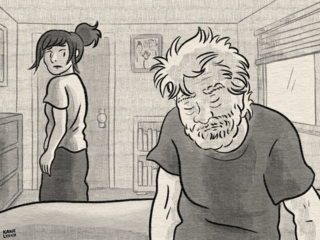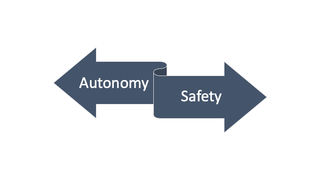Aging
Adult Child Caregivers and the Autonomy-Safety Dialectic
Grant yourself compassion when caring for a parent who's aged into disability.
Posted March 28, 2022 Reviewed by Ekua Hagan
Key points
- Those who live long enough age into disability and need assistance to manage our health and tasks of daily living.
- Adult children of “super-seniors” often struggle to balance respect for their parent’s autonomy with keeping them safe and sound.
- Helping one's parents who have aged into disability offers opportunities for an emotionally meaningful “long goodbye."
- When the "long goodbye" becomes a "prolonged goodbye," caregivers benefit from social support and treating themselves with grace and compassion.

My friend’s mother was dying, and her care needs were growing. “Come into the world a baby, and leave a baby,” my friend mused. She wasn’t wrong. As I’ve noted before, our care needs grow in our 80s and 90s. As we age into disability, we need help managing our health and the tasks of daily living. Our adult children, particularly our daughters, are often the ones to help. It’s a helping relationship complicated by the autonomy-safety dialectic.
The Autonomy-Safety Dialectic

One of the hardest things about watching our parents age into disability is their loss of personal control and freedom, what psychologists refer to as our “personal autonomy.” Most people don’t give this up easily even if it puts them at risk for injury, exploitation, malnutrition, and the like. It's hard to watch because on the one hand, we want to respect their autonomy, but on the other hand, doing so can negatively impact their health and safety. I call his tension the "autonomy-safety dialectic" (a dialectic is a tension between two related yet opposing forces). For adult children and their aging parents, this tension commonly emerges at the beginning of our parents’ decline when they reject our concerns and our solutions. We struggle with how hard to push it, not only because we have empathy, but because it harms our relationship to talk about it.
Assisted Autonomy
In a past post, I said that findings from gerontology and the psychology of aging suggest “assisted autonomy” is the key to caregivers’ balancing of safety and autonomy. This means that for as long as possible we give “super-seniors”:
- As many realistic choices as possible, within their abilities and ours
- A chance to do as many activities of daily living and personal care as they can
- The power to direct and participate in their caregiving
- A voice in medical decision-making, housing, and other decisions
But like lots of psychological advice, in practice, it’s complicated. This is currently a challenge in my life. Age and Parkinson’s disease have overtaken my father. He can barely talk, and can no longer write, stand, walk, or accomplish the tasks of daily living. Yet he is in denial about his disability and his mortality. He fights efforts to keep him safe. He’s so rude that no facility will accept him. Paid caregivers quit. Left to his own devices, he makes bad choices leading to injury.
When the Long Good-Bye Becomes the Prolonged Good-Bye
Experts, like the Family Caregiver Alliance, tell caregivers in these situations to validate, redirect, and make them feel heard. They tell us to respond with gentleness and patience. This often helps calm my father, and I recommend seeking informational social support to provide you with such strategies. But sometimes, he is stubborn and maddening no matter the approach. He wants control over his life and is mean when I don’t cooperate. I feel frustrated, angry, and hurt. I say nothing and leave. I stay away briefly until my anger wanes and my empathy and duty rule me once again.
I know I’ve said before that this stage of life offers the chance for the “long goodbye” where aging parents and their adult children can make emotionally meaningful connections. But the long goodbye isn’t all warm and fuzzy. For many of us, the long goodbye feels like the “prolonged goodbye” when our parent-patient is difficult, their quality of life is terrible, the money is running out, and/or providing or managing the caregiving costs us our freedom and health.
Conflicted Feelings Are Normal
My son, a graphic novelist, gifted me with a memoir by Roz Chast. Best known as a cartoonist for The New Yorker, her graphic novel, “Can’t We Talk About Something Pleasant?” chronicles her experience with her aging parents. Many of the complicated feelings she describes are common to family caregivers during the prolonged goodbye. Reading it, reaching out to family members and friends, and looking at websites for caregivers, helped me feel like maybe I’m not such a terrible person after all. If your situation is like mine, you may appreciate Chaz’s book, and you may find caregiver websites and caregiver support groups useful for emotional and informational support.
So yes, the long goodbye may be warm and touching, but it may also be angry, sad, resentful, guilty, stressful, or mundane, depending on the day, or the hour. And no, you’re not a bad person if you have the occasional "bad” thought, loss of temper, or resentful feeling. These are normal responses to the prolonged goodbye. You are entitled to your imperfection. Not only are you human, but what you are doing isn’t easy, and depending on your situation, it may be downright hard.
References
Burn, S.M. 2016. Unhealthy Helping. Create Space.
Lang, F.R., & Schutz, Y. (2002). Adult children’s supportive behaviors and older parents’ subjective well-being---A developmental perspective on intergenerational relationships. Journal of Social Issues, 58, 661-680.
Robinson, S.A., & Lachman, M.C. (2018). Perceived control and cognition in adulthood: The mediating role of physical activity. Psychology of Aging, 33, 769-781.
Tesch-Romer, C., & Wahl, H. (2017). Toward a more comprehensive concept of successful aging: Disability and care needs. Journal of Gerontology: Social Sciences, 72, 310-318.


